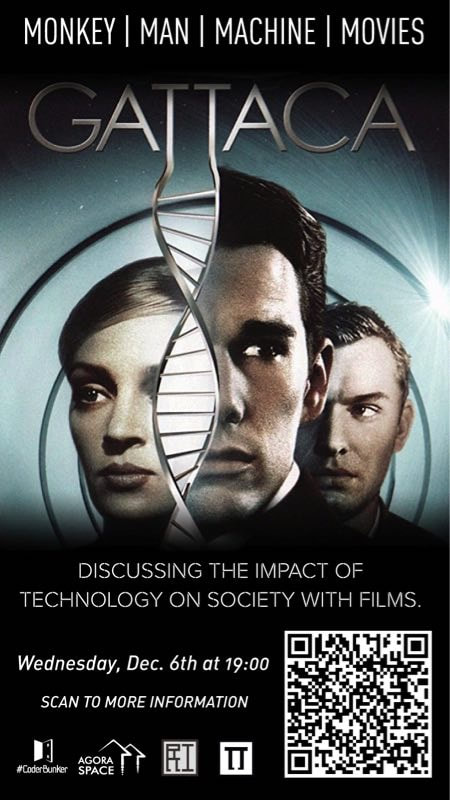4M is back with discussing the impact of technology on society by watching films. Last month we had Metropolis in observance of its 90th anniversary, this month we watch Gattaca in observance of its 20th anniversary premier screening. Is it really that long? I remember then studying in Madrid and the movie together with other 90s delicatessen like Reality Bites turning Ethan Hawke into my young adulthood hero. Infamous film critic Roger Ebert wrote about Gattaca that it is one of the smartest and most provocative of science fiction films, a thriller with ideas. Produced by Dany DeVito, written and directed by then only 33-year-old New Zealander Andrew Niccol, it surely deserves a prominent place in my otherwise lousy memory, and Niccol who also directed The Truman Show, but is otherwise rather unknown, a place amongst writers like H.G. Wells, Aldous Huxley and Isaak Asimov.
We are in the not too distant future and live in a society which determines through advanced biomedical technology at or even before birth the quality of human DNA on a scale from 1 to 10, establishing a biological caste system for access to the labor market and thus for one’s place in society. Ethan Hawke alias Vincent Freeman is diagnosed at birth with a 99% probability of heart failure amongst other likely diseases and a life expectancy of 30.2 years. His parents are devastated and don’t want to leave anything up to chance; they decide to have their second child through in-vitro fertilization and pick from a menu of their own DNA’s best physical and mental features. Vincent’s brother Anton is born two years later and - worthy of carrying their father’s name - soon outperforms Vincent in all physical activities.
Despite his fate as member of a future pariah class, Vincent dreams of becoming a stellar navigator, a profession reserved for the biological elite of humanity. He defies his parents’ recurring comments on his inability to reach such a goal and devours any literature on space travel, he can get his hand on. In particular the scenes in the family setting make me think of psychologists Carol Dweck and Martin Seligman. Dweck’s research confirmed that people with a growth mindset, i.e. those who believe that they succeed if they work hard, always outperform those with a fixed mindset, i.e. those who think that they have certain talents and qualities and can only go that far. Seligman, who wrote a lot on optimism coined the term learned helplessness, an impotence conditioned by own negativity, which can be treated with cognitive behavioral therapy.
Gattaca shows in this regard the limits of an individual growth mindset or exuberant optimism by setting it against a fixed family and fixed social mindset. The family as a society’s smallest unit and the society at large are powerful system which usually succeed in overriding an individual growth mindset. With a clear aesthetic reference to Kurt Lang’s Metropolis and Hitler Germany, Gattaca portrays a society which has adopted a fixed mindset culture. 19th and early 20th century eugenics policies which culminated in the Jewish holocaust determined that certain races were superior to others. Gattaca shows a society which is not anymore divided along the racial, but along the DNA line, in effect establishing similar social rules of in- and exclusion.
We remember that mentally retarded and physically handicapped were put into concentration like camps during WWII; we know how developing societies still marginalize or even exclude the unfortunate. Niccol starts his film with a quote from Ecclesiastes 7:13, Consider God’s handiwork; who can straighten what he hath made crooked? and certainly sparks with Gattaca a discussion about ethics in technology. Who is to draw the line between worthy and unworthy life? To what end is biotechnology a mean? Is life indeed only about striving for perfection and progress or is it about inclusion, integration and above all general well-being?
The philosopher Rudolf Steiner established in the early 19th century anthroposophy as an inclusive social theory; one of his disciples, the pediatrician Karl König founded on the basis of his teachings in 1940 probably as a reaction to the WWII atrocities the Camphill Movement, a nonprofit organization that provides support for the education, employment, and daily lives of adults and children with developmental disabilities, mental health problems, or other special needs. The Camphill Movement has successfully spread throughout most of the Western world and more than 100 communities continue to flourish. They provide a model for an inclusive society, a culture which rejects eugenics and transhumanism.
We combined Gattaca with a TEDx talk by Riccardo Sabatini, an Italian born physicist who specializes on the intersection of data science and the human biology. He explains that as of 2016 his then employer Human Longevity Inc., founded by leading genome scientist Craig Venter, was able to predict through DNA analysis with 80% accuracy parameters like eye color, height and life expectation. Niccol’s 1997 take on the future seems thus to be close to reality as of 2017 and the urgency to discuss the purpose of genome sequencing and personalized medicine is extremely high.
As long as our societies are driven by competitiveness and economies which motivate taking instead of giving, we run risk to turn them into highly unpleasant systems, not only for those who are already marginalized, but for most if not all of humanity. Personalized medicine must therefore be seen as both a threat and an opportunity, and its application must follow as the application of all technology only one paradigm: it is a mean for a life supporting end or in accordance with the book Ecclesiastes, fix what is broken, but acknowledge imperfection which has a purpose.
Jude Law alias Jerome Morrow, who lends Vincent Freeman his impeccable DNA identity, reminded me of Nick Vujicic, the author of Life without Limits. While Jerome decided to put an end to his jackpot DNA vessel and ended up in a wheelchair, Nick was born without limbs. He struggled throughout his youth and adolescence with negativity and despair despite a loving and supporting family. It was only a life changing spiritual experience which made him realize that he was physically imperfect, but it was through this imperfection that he found his purpose.
A combination of Chinese plans to introduce a cyberleninist citizen score based on one’s online behavior combined with genome sequencing applications which create superhumans does indeed sound like a close future dystopia. We discussed after the film screening what technologies and which institutions could actually stop such a development and concluded that technological transparency and the right set of values with an economic system are central pillars. With privacy already mostly lost, we need to embrace a future which is defined by total transparency of all our actions if not even thoughts. But such an extrinsic motivation will not be enough to create a system which we will enjoy living in; it does in addition take a transformation of our intrinsic motivation which is set by our economies.
In the end, we need to mutually respect our most basic need for safety and security, i.e. feeling safe and comfortable in our bodies, and should be motivated by supporting each other to follow our dreams. We all too often forget that our bodies and thus all of contemporary science is only ordinary matter. If we want to achieve the impossible, we have to listen to the voice from within, unique to each one of us, and tap into dark matter. Thus, Gattaca’s punch line is Jude Law telling Ethan Hawke shortly before his take off into space that, I got the better end of the deal: I only lent you my body but you lent me your dream.

